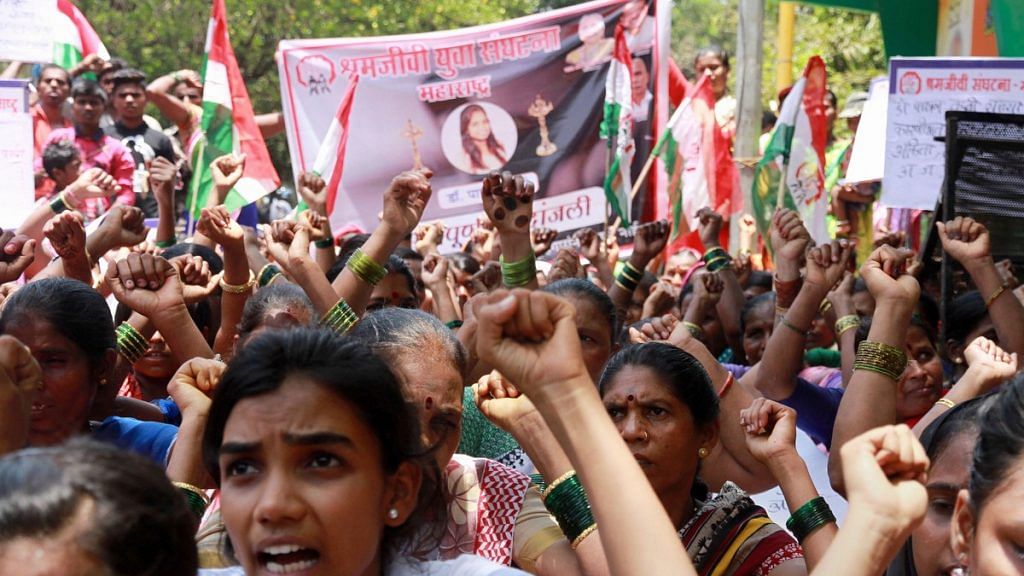New Delhi: An AIIMS group for social justice that met to condole the suicide of tribal student Dr Payal Tadvi in Mumbai likened it to Rohith Vemula’s “institutional murder”, and said caste discrimination is still routine but subtle in India’s premier medical college in the national capital.
The comments came after AIIMS’s Front for Social Consciousness held a discussion Friday to address caste discrimination across Indian educational institutions, in the aftermath of Tadvi’s death. She committed suicide on 22 May after being allegedly subjected to casteist slurs by her peers while she was completing residency in gynaecology from BYL Nair Hospital in Mumbai.
“Originally we wanted to hold the meeting on 13 May, but the administration opposed it. They didn’t give us permission and imposed restrictions. For example, they said if we wanted to put out a press release we would first have to seek permission from the director’s office,” said Dr Harjit Singh Bhatti, a senior resident at AIIMS and member of the Forum for Social Consciousness.
Permission to hold the talk at the institute came only after news of Tadvi’s death became widespread.
Much like Rohith Vemula’s death in Hyderabad in 2015, Tadvi’s suicide is also being called an “institutional murder” for laying bare the systemic nature of casteism and discrimination in education institutes, which can ultimately lead to suicide. Tadvi’s family claims authorities were well aware of her state of distress, but still took no protective measures to ensure her safety.
The Mumbai incident comes 12 years after AIIMS became the first higher education institution where systemic caste discrimination and abuse was investigated. After a spate of complaints, the Manmohan Singh government ordered an independent probe into the matter, resulting in the Thorat Committee report. It found, at the time, that 72 per cent of SC/ST students felt discriminated against during teaching sessions.
Since the 2007 report, doctors at AIIMS — both from the social justice group and the faculty — admit that casteism on campus is “a fact”, but that it is more “invisible now”.
“Discrimination is still happening — there is definitely a sense of social exclusion and bias,” said Dr H.L. Nag, senior sports doctor and member of the erstwhile Forum for Rights and Equality at AIIMS.
“But it is not overt. Most has subsided. It would be difficult to furnish proof of it,” he said.
Also read: Dr Payal Tadvi was hardworking, loved dancing and was hooked to ‘Game of Thrones’
English remains a point of intimidation
Levels of English are still a point of anxiety for students from backward classes and castes, faculty members told ThePrint.
“In the classroom set up, it is the first place where difference can be detected. So students don’t come out and voice their difficulties. They are afraid of what the consequences might be,” said Dr. L.R. Murmu, doctor of surgery.
“Teachers can also make the mistake of treating all students in class the same way, and don’t adjust to accommodate the needs of students who need the extra help. There is a lack of communication between the two.”
The Thorat committee in its report recommended an English programme to be set up to help reserved students better navigate through English language classes.
While this has been set up, residents don’t have access to it, said Murmu.
Thorat report and history of caste violence at AIIMS
The Thorat Committee’s findings revealed that about 69 per cent of SC/ST students at AIIMS felt they did not receive adequate support from teachers, and about 76 per cent of students mentioned that their papers were not examined properly.
Students reported discrimination in living spaces, the mess, and in the selection of class representative in overwhelming numbers — 88 per cent, 76 per cent, and 76 per cent, respectively.
At the time, AIIMS simultaneously became the bedrock of the country’s anti-reservation agitation. The report found “sufficient evidence to support the view the administration of the AIIMS headed by the Director Dr. Venugopal played a proactive role” in the agitation, referring to the institute’s then chief.
“Even though ragging is officially banned in the AIIMS, there appears to be is a one month period of unofficial ragging. Students of SC/ST category have stated that ragging has serious caste overtones and several forms of humiliation are meted out to them,” read the report.
“The unofficial ragging still happens,” Nag told ThePrint.
A follow-up report on caste based violence and harassment hasn’t been implemented in AIIMS, even though 2 SC/ST students committed suicide since it was published.
In 2010, Balmukund Bharti, a final year MBBS Dalit student, hanged himself allegedly due to caste discrimination and inability to cope with English language studies. Two years later, in 2012, tribal student Anil Kumar Meena killed himself in a similar manner.
“Since the report came out, some recommendations have been paid heed. There is an orientation programme to sensitise teachers and students. A grievance cell has also been set up,” said Dr Murmu.
Dr P.K. Rathore, member of Delhi’s SC/ST Medical Association, said, “Things have definitely improved overall for students from marginalised communities, and that also needs to be said. Most have been co-opted, and discriminating outwardly is not so common any more.”
Also read: Less than 20% with foreign MBBS degrees eligible to work as doctors in India
‘Still widespread’
While things at AIIMS might have improved, professor S.K. Thorat, who chaired the 2007 panel, said a lot more can be done.
“We don’t have a law against discrimination for education institutions, only an anti-ragging law. Discrimination against SC/STs in educational institutions must be tackled at this legal level, and also through education.
“In the UK, there is a mandatory subject called Citizenship Education which addresses social problems. India’s higher education institutions must teach a similar civic education course,” he told ThePrint.
